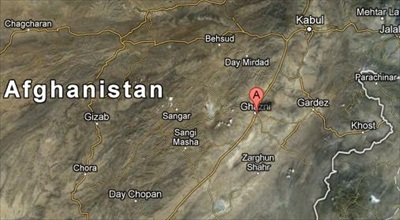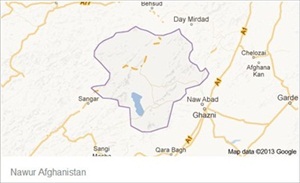Afghanistan – May 10, 2013 |
Update – July 7, 2013
- Three Hazaras reportedly killed in Behsood by Taliban Kuchis – July 7
Hazara sources from Afghanistan have reported the “annual ritual” of attacks by Pashtun nomads, known as Kuchis, on the Hazara inhabited regions of Afghanistan (historically known as Hazarajat or Hazaristan). In the past attacks, heavily armed Taliban have been involved in the attacks under the guise of Kuchis.
Ghazni, Afghanistan
Attack is ongoing in Nawur in Ghazni, Afghanistan
- Past Attacks: 2012 | 2010 | 2002Note: Kuchi attack is an annual ritual. Currently, we only have limited documentation on the conflict.
According to sources, the attacks have started against Hazaras living in Nawur – district of Ghazni province. Reports say Kuchis are well-armed and have Taliban support. Many Hazara families forced to flee and Kuchis looted and burned their home.
Loots from Hazara village can be seen on one of the SUV’s
with white Taliban flag during 2010 attacks [ More ]
The Hazara Kuchi Conflict
Every spring season, the Hazara homeland – historically known as the Hazarajat – in Afghanistan comes under attack by the Pushtun nomads commonly known as the Kuchis. The Kuchis contend that they have historical documents by the Afghan Government giving their livestock graving rights which also includes lands in the Hazara homeland. Resistance by the local Hazaras to stop the Kuchi’s on the land they consider home has met with violence by these heavily armed Kuchis who have killed hundreds of Hazaras as a result, burnt down entire villages and looted the Hazara homes as an “annual killing ritual.” In recent years, there has been ample proof of heavy involvement by the Taliban in the guise of the Kuchis seen with their signature white flag on Four by Four Pickup trucks, and heavy weaponry (negating the idea that they are simply nomads).
The roots of the conflict also lies in genocide of the Hazaras during 1890’s by the Afghan Pushtun Ruler, Amir Abdur Rahman Khan, in which an estimated 60% of Hazara population was exterminated, tens of thousands of Hazaras were sold as slaves, and their lands distributed to the Pushtuns as a reward for taking part in the genocide. Over the past 100 years, the Pushtun dominated governments have continued their persecution and discrimination of Hazaras. On the other hand, they have given full advantage as well as “legal” rights to their ethnic kin in taking control of more and more Hazara land through these discriminatory policies. The Kuchis enjoy unlimited power and unfettered access to the Pushtun elites in the Afghan Government. In a country which has never had any census and cannot even count its non-moving populating, the Afghan Government has surprisingly come with numbers for the always-moving nomadic population, giving them reserved seats in the parliament and one “Kuchi Affairs Minister.”
Following are some of the main causes of the yearly attacks on the Hazara homeland:
- Annual attacks yields huge monetary returns to the Kuchis for the loss of “their” grazing lands
- Afghan Government’s recognition of “Kuchi rights” provides an excuse for the armed looting, plundering, burning, of Hazara villages in which hundreds of Hazaras have been killed
- Under the cover of Kuchis, Taliban are able to infiltrate deep inside the Hazara territories without any challenge
Background Information on Kuchi Conflict
- Nomad Expansion and Commerce in Central Afghanistan: A Sketch of Some Modern Trends by Klaus Ferdinand (Research and publish date: 1953-55, 1963) [ PDF ]
- Secret Letter of Mullah Omar to Kuchis – Following Farman (decree) was issued by Mullah Omar to the Kuchis. The origional document was in Pushtu which was ditributed among Pushtoon Kuchis (nomads).Date of this letter could not be ascertained, however, Mullah Omar is not mentioned as “Amir Ul Momineen”, the time frame of this letter is probably around March, 1996 – [ Dari | Urdu ]
- Recommended Strategy for Conflict Resolution of Competing High Pasture Claims of Settled and Nomadic communities in Afghanistan by UN Environment Programme
- The Behsud Conflicts, 2005-2008 (1384-1387) and a Blueprint to Avoid Further Clashes in 2009 (1388) and Beyond by Dr. Lenard Milich
- Reality of Afghan Kuchis
For over two centuries, the Pushtun rulers of Afghanistan played the Kochee (Pushtun Nomads) card in inflating their population to gain political benefits in Afghanistan
[ More relevant documents in the Downloads section ]
Sources
admin
Latest posts by admin (see all)
- ISIS claims gruesome murder of 10 Hazara coalminers in Pakistan - January 5, 2021
- Farewell Hussain Babai - December 20, 2020
- Hazaras categorically reject US-engineered ‘Taliban talks’ in Qatar - September 12, 2020


